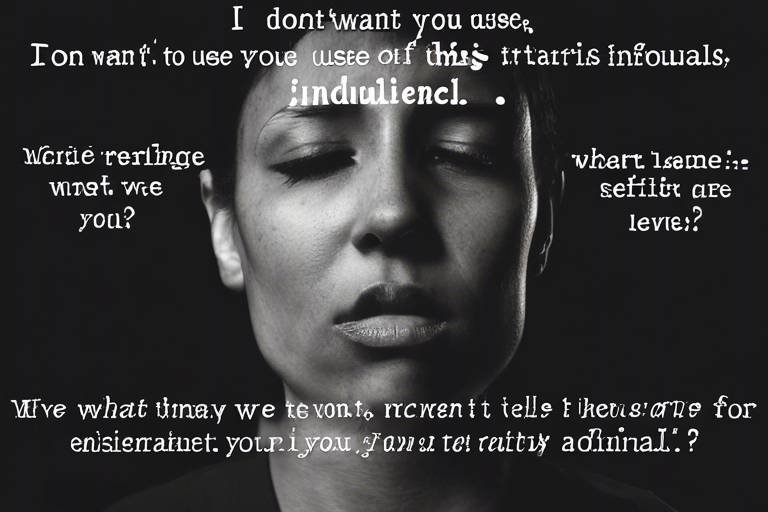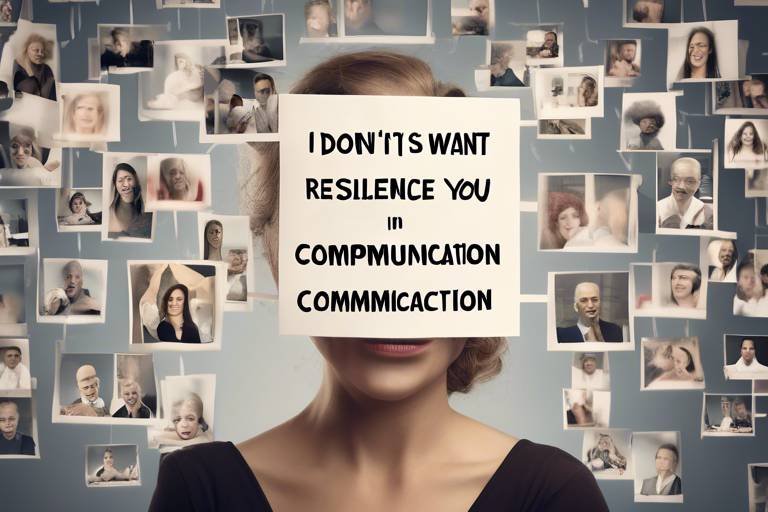Traits of Resilient Individuals - What Can We Learn?
In today's fast-paced world, the ability to bounce back from adversity is more important than ever. Resilience isn't just a buzzword; it's a vital skill that can significantly impact our personal and professional lives. Resilient individuals display a unique set of traits that empower them to navigate life's challenges with grace and strength. So, what exactly can we learn from these remarkable people? This article dives deep into the characteristics that define resilience and how we can cultivate these traits in our own lives.
Resilience is the capacity to recover quickly from difficulties. It’s like a rubber band that stretches but doesn’t break. In both personal and professional contexts, resilience shapes how we respond to life's inevitable challenges. Whether it's dealing with a job loss, facing a health scare, or coping with the stress of daily life, resilient individuals approach these situations with a mindset that fosters growth and recovery. They don’t just survive; they often thrive, transforming obstacles into opportunities. This ability to adapt and bounce back is what sets resilient individuals apart from the crowd.
One of the key traits of resilient individuals is their high level of emotional awareness. They possess the ability to recognize and manage their feelings effectively, which is crucial during tough times. By understanding their emotions, resilient people can develop better coping strategies. For instance, when faced with stress, they are more likely to identify their feelings and seek constructive ways to address them rather than letting emotions spiral out of control. This emotional intelligence not only helps them cope but also enhances their relationships with others, creating a supportive network that further bolsters their resilience.
Self-regulation is another critical aspect of resilience. It involves maintaining emotional balance, especially in challenging situations. Resilient individuals use various techniques to control their emotions and reactions. For example, they might practice deep breathing, take a moment to pause before responding, or engage in physical activities to release pent-up stress. By promoting healthier responses to adversity, self-regulation helps them navigate challenges with a clearer mind and a steadier heart.
Mindfulness practices are essential tools that resilient individuals incorporate into their daily routines. These practices help them stay grounded in the present moment, preventing them from becoming overwhelmed by past regrets or future anxieties. Techniques such as meditation, yoga, and even simple breathing exercises can significantly enhance emotional well-being. By fostering a state of mindfulness, resilient individuals can approach challenges with a calm and focused mindset, making it easier to tackle whatever life throws their way.
Setting realistic goals is vital for building resilience. Resilient individuals know the importance of having clear, achievable objectives to work towards, especially during tough times. By breaking larger goals into smaller, manageable steps, they maintain focus and motivation, even when the going gets tough. This structured approach not only provides a sense of direction but also instills a sense of accomplishment as they progress, further reinforcing their resilience.
Building and nurturing positive relationships is a hallmark of resilient individuals. They understand that social support plays a crucial role in weathering life's storms. Whether it's friends, family, or colleagues, having a strong support network can significantly bolster resilience during difficult times. Resilient people are often skilled at fostering these connections, reaching out for help when needed, and offering support to others in return. This reciprocal relationship creates a safety net that allows them to face challenges with greater confidence.
Adaptability is another key trait that defines resilient individuals. The ability to adjust to new circumstances and embrace change is essential in a world that is constantly evolving. Resilient people view change not as a threat but as an opportunity for growth. They are flexible in their thinking and can pivot when necessary, which fosters resilience and promotes personal development. This adaptability allows them to navigate life's uncertainties with a sense of ease and confidence, transforming potential setbacks into stepping stones for success.
Effective problem-solving skills empower resilient individuals to tackle challenges head-on. They approach problems analytically, breaking them down into manageable parts and devising practical solutions. This proactive mindset allows them to see obstacles as puzzles to be solved rather than insurmountable barriers. By honing these skills, they not only enhance their resilience but also inspire those around them to adopt a similar approach to life's challenges.
Resilient individuals have a unique perspective on failure. Rather than viewing setbacks as definitive endpoints, they see them as valuable learning opportunities. This mindset shift enables them to embrace failure, reflect on what went wrong, and adjust their strategies moving forward. By learning from their experiences, they build a stronger capacity to face future challenges with renewed vigor and insight. This ability to bounce back from failure is not just about resilience; it's about cultivating a growth mindset that fosters continuous personal development.
- What is resilience? Resilience is the ability to recover from difficulties and adapt to challenges effectively.
- How can I become more resilient? You can become more resilient by developing emotional awareness, practicing mindfulness, setting realistic goals, and building positive relationships.
- Is failure a part of resilience? Yes, resilient individuals view failure as a learning opportunity that contributes to their growth and ability to face future challenges.

Understanding Resilience
Resilience is more than just a buzzword; it's a vital skill that enables us to navigate the turbulent waters of life. Imagine resilience as a sturdy ship, equipped to weather the fiercest storms. It’s the ability to bounce back from adversity, challenges, and setbacks, emerging stronger than before. In both personal and professional contexts, resilience plays a crucial role in shaping our responses to life's inevitable ups and downs.
When we think about resilience, it’s essential to recognize that it doesn’t mean we won’t face difficulties. Rather, it’s about how we respond when those challenges arise. Resilient individuals tend to possess a unique mindset that allows them to view obstacles not as roadblocks, but as opportunities for growth. This perspective is significant because it influences not only how we handle stress but also how we approach our goals and relationships.
In the workplace, for example, resilience can lead to increased productivity and job satisfaction. Employees who are resilient are often more adaptable to change and better equipped to manage stress. They understand that setbacks are part of the journey, and they use these experiences to fuel their motivation. In personal life, resilience helps us cope with loss, disappointment, and change, allowing us to maintain our emotional well-being.
To better understand resilience, we can break it down into several key components. These components include:
- Emotional Regulation: The ability to manage emotions effectively.
- Social Support: Building and maintaining relationships that provide encouragement.
- Adaptability: Adjusting to new circumstances and embracing change.
- Problem-Solving Skills: Finding effective solutions to challenges.
Each of these traits contributes to a resilient mindset, helping individuals face difficulties with confidence and poise. Understanding these components can empower us to cultivate resilience in our own lives. By recognizing the importance of resilience, we can take active steps toward enhancing our coping strategies and ultimately lead a more fulfilling life.
Q: Can anyone become resilient?
A: Yes! Resilience is not an innate trait; it can be developed over time through practice and experience.
Q: What are some everyday practices to build resilience?
A: Engaging in mindfulness, setting realistic goals, and fostering positive relationships are excellent ways to enhance resilience.
Q: How does resilience affect mental health?
A: Resilience can significantly improve mental health by providing individuals with the tools to manage stress and recover from setbacks.

Emotional Awareness
Emotional awareness is like having a superpower in the world of resilience. It’s the ability to recognize, understand, and manage our emotions effectively. Imagine being in a storm, with winds howling and rain pouring down; those who are emotionally aware can navigate through the chaos without losing their footing. They can identify when they're feeling anxious, stressed, or overwhelmed, which allows them to respond rather than react impulsively.
This trait is particularly significant because it lays the foundation for effective coping strategies during tough times. When resilient individuals face challenges, their emotional awareness helps them to pause and assess their feelings instead of being swept away by them. For instance, when confronted with a setback at work, rather than succumbing to frustration, they might take a moment to acknowledge their feelings and think about constructive steps forward. This practice not only helps in managing stress but also fosters a sense of control over one's life.
To enhance emotional awareness, resilient individuals often engage in various practices. Here are a few techniques that can help anyone improve their emotional intelligence:
- Journaling: Writing down thoughts and feelings can provide clarity and insight into emotional patterns.
- Talking it out: Sharing feelings with a trusted friend or therapist can help in processing emotions effectively.
- Self-reflection: Taking time to reflect on daily experiences and emotional responses can enhance understanding and awareness.
By developing emotional awareness, we can cultivate a healthier relationship with our emotions. It’s not about suppressing feelings but rather understanding and embracing them. This leads to better decision-making and a more balanced emotional state. Resilient individuals often find that this awareness helps them to maintain a positive outlook, even when faced with adversity.
Furthermore, emotional awareness serves as a bridge to self-regulation. When we know what we’re feeling, we can take steps to manage those emotions effectively. For example, if someone recognizes that they’re feeling overwhelmed, they might choose to practice deep breathing or take a short walk to clear their mind. This proactive approach not only mitigates stress but also reinforces their resilience.
In summary, emotional awareness is a vital component of resilience. By understanding and managing our emotions, we can navigate life’s challenges with greater ease and confidence. It empowers us to respond thoughtfully rather than react impulsively, paving the way for healthier coping strategies and stronger relationships.

Self-Regulation
Self-regulation is like the steering wheel of our emotional vehicle; it allows us to navigate through the twists and turns of life with greater ease. Resilient individuals have mastered the art of self-regulation, which is crucial for maintaining emotional balance, especially during turbulent times. When faced with stress or adversity, they don’t just react impulsively; instead, they take a moment to assess their feelings and choose their responses wisely. This ability to pause and reflect is what sets them apart from those who may struggle to cope.
So, how do resilient people achieve this level of self-control? It often involves a combination of techniques and practices that help them stay grounded. One of the key methods is emotional awareness, which allows them to recognize their feelings without being overwhelmed by them. Understanding the root of their emotions enables them to respond in a way that is constructive rather than destructive. For instance, when feeling anxious about a looming deadline, a resilient person might acknowledge their anxiety, but instead of succumbing to panic, they create a plan to tackle the task step-by-step.
Another vital aspect of self-regulation is the practice of mindfulness. Mindfulness techniques, such as meditation or deep-breathing exercises, help individuals stay present and focused. By incorporating these practices into their daily routines, resilient individuals cultivate a sense of calm that empowers them to face challenges head-on. Here’s a brief overview of some effective mindfulness practices:
- Deep Breathing: Taking slow, deep breaths can help reduce stress and center the mind.
- Meditation: Spending a few minutes in quiet reflection can enhance emotional clarity.
- Journaling: Writing down thoughts and feelings can provide insight and promote emotional processing.
Moreover, setting realistic and achievable goals plays a significant role in self-regulation. Resilient individuals understand that having clear objectives helps maintain focus and motivation, especially when the going gets tough. They break down their goals into manageable steps, which prevents them from feeling overwhelmed. This approach not only fosters a sense of accomplishment but also reinforces their ability to stay on track, even when faced with setbacks. For example, instead of aiming to complete a project in one go, they might set smaller milestones, celebrating each achievement along the way.
In conclusion, self-regulation is a powerful tool in the toolkit of resilient individuals. By harnessing emotional awareness, practicing mindfulness, and setting achievable goals, they can maintain their emotional equilibrium. This not only aids in coping with stress but also enhances their overall quality of life. The next time you find yourself navigating through a challenging situation, remember that taking control of your emotions is within your reach. With practice, you too can steer your emotional vehicle toward resilience and strength.

Mindfulness Practices
When it comes to enhancing resilience, play a pivotal role. These techniques are not just trendy buzzwords; they are powerful tools that help individuals stay grounded in the present moment, especially during times of stress and uncertainty. Imagine standing on a rocky shore, waves crashing around you, but instead of being swept away, you find your balance and breathe deeply. That’s the essence of mindfulness—finding peace amidst chaos.
Resilient individuals often incorporate various mindfulness practices into their daily routines, creating a sanctuary of calm that helps them navigate life's challenges. One of the most effective ways to cultivate mindfulness is through meditation. Just a few minutes of meditation each day can significantly improve emotional regulation and reduce anxiety. It’s like giving your mind a mini-vacation, allowing it to recharge and refocus.
In addition to meditation, deep breathing exercises are another fantastic mindfulness practice. These exercises are simple yet incredibly effective. By taking a moment to focus on your breath—inhale deeply through your nose, hold for a few seconds, and exhale slowly through your mouth—you can create a sense of calm that permeates your entire being. This practice not only helps in managing stress but also enhances your overall emotional awareness.
Moreover, mindfulness can also be practiced through daily activities. Whether you’re eating, walking, or even washing the dishes, bringing your full attention to the task at hand can transform mundane moments into opportunities for mindfulness. Think of it as savoring each bite of your favorite meal instead of rushing through it. This not only increases your appreciation for the moment but also helps you develop a greater sense of gratitude and contentment.
To give you an idea of how mindfulness practices can be integrated into daily life, here’s a simple table outlining some effective techniques:
| Mindfulness Practice | Description | Benefits |
|---|---|---|
| Meditation | Focusing your mind to achieve a state of calm. | Reduces stress, improves focus, enhances emotional regulation. |
| Deep Breathing | Consciously controlling your breath. | Promotes relaxation, decreases anxiety, improves clarity. |
| Mindful Eating | Paying full attention to the experience of eating. | Enhances enjoyment, promotes healthier eating habits, fosters gratitude. |
| Body Scan | A meditation technique focusing on different body parts. | Increases body awareness, reduces tension, promotes relaxation. |
Incorporating these mindfulness practices into your life doesn’t have to be overwhelming. Start small. Perhaps dedicate five minutes each morning to meditation or practice deep breathing when you feel stressed. Over time, these small changes can lead to significant improvements in your emotional resilience, helping you to bounce back from life’s challenges with greater ease.
Ultimately, the journey to resilience is not just about facing adversity; it’s also about nurturing a mindset that embraces the present moment. Mindfulness practices are like the gentle waves that smooth out the rough edges of our experiences. By fostering this awareness, we can cultivate a deeper sense of peace and strength, enabling us to face whatever life throws our way.
- What is mindfulness? Mindfulness is the practice of being fully present and engaged in the moment, without judgment.
- How can I start practicing mindfulness? Begin with simple techniques like meditation or deep breathing exercises, and gradually incorporate mindfulness into your daily activities.
- Can mindfulness help with stress management? Yes, mindfulness practices are proven to reduce stress and enhance emotional regulation, making it easier to cope with challenging situations.

Goal Setting
Setting realistic goals is not just a task for the ambitious; it's a vital component of resilience that can significantly influence how we navigate life's ups and downs. When resilient individuals approach goal setting, they do so with a strategic mindset, understanding that their goals must be achievable yet challenging enough to foster growth. Imagine trying to climb a mountain without a clear path; it’s overwhelming and often leads to frustration. However, with well-defined goals, that mountain becomes a series of smaller hills, each one conquered bringing a sense of accomplishment and motivation to tackle the next.
Resilient people often employ the SMART criteria in their goal-setting process. This means their goals are Specific, Measurable, Achievable, Relevant, and Time-bound. By adhering to this framework, they create a roadmap that not only clarifies their objectives but also provides a sense of direction and purpose. For instance, rather than saying, "I want to get fit," a resilient person might set a goal like, "I will run a 5K in three months by training three times a week." This specificity makes the goal tangible and less daunting.
Furthermore, breaking down larger goals into smaller, manageable tasks can significantly enhance a person's motivation and resilience. This approach allows individuals to celebrate small wins, which can be incredibly empowering. Each completed task acts as a stepping stone, reinforcing the belief that they are capable of overcoming challenges. For example, if someone aims to write a book, they might set daily word count targets instead of focusing solely on the final manuscript. This not only makes the process less intimidating but also fosters a habit of consistency, which is crucial for resilience.
Another key aspect of goal setting for resilient individuals is the importance of flexibility. Life is unpredictable, and sometimes, despite our best efforts, things don’t go as planned. Resilient people understand this and are willing to adjust their goals as circumstances change. This adaptability is a powerful trait, allowing them to pivot when faced with obstacles rather than feeling defeated. For example, if a job search doesn’t yield immediate results, a resilient person might shift their focus to enhancing their skills or expanding their network, rather than giving up.
In conclusion, effective goal setting is more than just a strategy for achieving success; it's a fundamental aspect of resilience. By setting clear, manageable, and flexible goals, we can cultivate a mindset that not only prepares us to face challenges but also empowers us to thrive in the face of adversity. So, the next time you find yourself grappling with a tough situation, remember that your goals can be your guiding light, illuminating the path forward.
- What are SMART goals? SMART goals are Specific, Measurable, Achievable, Relevant, and Time-bound objectives that help individuals clarify their goals and create a clear plan for achieving them.
- How can I stay motivated while pursuing my goals? Break your goals into smaller tasks, celebrate small achievements, and maintain a flexible approach to adapt to changes along the way.
- Why is flexibility important in goal setting? Flexibility allows you to adjust your goals as circumstances change, helping you stay resilient and focused on your overall objectives.
- Can goal setting improve my mental health? Yes, setting and achieving goals can provide a sense of purpose and accomplishment, which are beneficial for mental well-being.

Positive Relationships
Building and maintaining is not just a nice-to-have; it’s a cornerstone of resilience. Think about it: when life throws us curveballs, who do we turn to? Friends, family, and even colleagues play a vital role in how we navigate through tough times. Resilient individuals understand this intrinsic value and actively cultivate their social networks, ensuring they have a solid support system in place. Imagine a sturdy bridge; it’s not just the materials that make it strong, but the connections that hold it together. Similarly, our relationships provide the emotional scaffolding we need to weather life’s storms.
At its core, resilience is about connection. When we face adversity, having someone to share our feelings with can lighten the load significantly. Resilient people often engage in open and honest communication, which fosters trust and understanding. This openness not only helps in relieving stress but also encourages others to share their experiences, creating a mutual support system. In fact, studies have shown that individuals with strong social ties are more likely to recover from setbacks than those who go it alone. It’s like having a safety net; when you fall, there are people ready to catch you.
Moreover, positive relationships provide a sense of belonging. When we feel connected to others, we are less likely to experience feelings of isolation and loneliness, which can exacerbate stress and anxiety. Resilient individuals often seek out communities—be it through clubs, volunteer work, or social gatherings—that align with their values and interests. This not only enhances their emotional well-being but also broadens their perspectives, making them more adaptable in the face of change.
Another crucial aspect of positive relationships is the reciprocal nature of support. It’s not just about receiving help; it’s also about giving it. Resilient people often find strength in helping others, which not only boosts their confidence but also reinforces their own sense of purpose. When you lend a hand, you’re not only supporting someone else; you’re also building your own resilience. It’s a powerful cycle of giving and receiving that fosters deeper connections and a stronger community.
To illustrate the impact of positive relationships on resilience, consider the following table:
| Aspect | Impact on Resilience |
|---|---|
| Emotional Support | Reduces stress and promotes mental well-being |
| Trust | Encourages open communication and vulnerability |
| Shared Experiences | Fosters a sense of belonging and community |
| Mutual Aid | Builds a cycle of support that strengthens bonds |
In summary, the importance of positive relationships in fostering resilience cannot be overstated. They not only provide emotional support during challenging times but also enhance our ability to adapt and grow. By nurturing these connections and being proactive in our social engagements, we can build a robust network that not only helps us bounce back from adversity but also propels us forward in life.
- What are the key characteristics of resilient individuals?
Resilient individuals often exhibit traits such as emotional awareness, adaptability, strong problem-solving skills, and the ability to build positive relationships. - How can I improve my resilience?
You can enhance your resilience by cultivating emotional awareness, practicing mindfulness, setting realistic goals, and building a supportive social network. - Why are positive relationships important for resilience?
Positive relationships provide emotional support, foster a sense of belonging, and create a reciprocal system of aid that strengthens our ability to cope with challenges.

Adaptability
Adaptability is a key trait of resilient individuals, acting as a lifeline when faced with the unpredictable waves of life. Imagine being on a surfboard, riding the waves; it’s not just about balancing but also about adjusting your stance as the waves change. Resilient people are like expert surfers—they know how to pivot and adapt to whatever comes their way. This ability to adjust to new circumstances and embrace change is not just a survival skill; it’s a pathway to personal growth and success.
Being adaptable means being open to new ideas and experiences. Resilient individuals understand that life is filled with surprises, and instead of resisting change, they welcome it. They possess a mindset that views challenges as opportunities for growth. For instance, when faced with a sudden job loss, a resilient person might not only look for new job opportunities but also consider pursuing a passion or starting a new venture. This proactive approach allows them to navigate through life's uncertainties with grace.
Moreover, adaptability involves a willingness to learn. Resilient individuals often engage in continuous learning, whether through formal education, self-study, or simply by embracing new experiences. They understand that each challenge presents a chance to acquire new skills and knowledge. This attitude fosters a growth mindset, which is crucial for overcoming obstacles. When you view setbacks as stepping stones rather than stumbling blocks, you cultivate resilience.
In addition to a growth mindset, effective problem-solving skills play a significant role in adaptability. Resilient individuals are adept at analyzing situations and crafting practical solutions. They approach problems with a sense of curiosity, asking themselves questions like, "What can I learn from this?" or "How can I turn this situation to my advantage?" This analytical approach not only helps them find solutions but also empowers them to remain calm and focused during stressful times.
To illustrate this point, consider a workplace scenario where a project faces unexpected delays. Rather than panicking, a resilient team might brainstorm alternative strategies, reassign tasks, or adjust deadlines. They adapt their plans to the new reality, demonstrating flexibility and resourcefulness. This not only helps them to overcome the immediate challenge but also strengthens their teamwork and communication skills.
In summary, adaptability is a cornerstone of resilience. By embracing change, fostering a growth mindset, and honing problem-solving skills, resilient individuals can navigate life's ups and downs with confidence. They remind us that while we may not have control over every situation, we do have control over how we respond to it. So, the next time life throws you a curveball, channel your inner resilient surfer and ride the wave with adaptability!
- What is adaptability?
Adaptability is the ability to adjust to new conditions and embrace change, which is crucial for resilience. - How can I improve my adaptability?
Practice being open to new experiences, learn continuously, and develop problem-solving skills. - Why is adaptability important for resilience?
Adaptability allows individuals to navigate challenges effectively, turning obstacles into opportunities for growth.

Problem-Solving Skills
Effective are like a Swiss Army knife for resilient individuals; they’re versatile, essential, and can help tackle a wide range of challenges. When faced with obstacles, resilient people don’t just sit back and wait for solutions to drop in their laps. Instead, they actively engage with the problem, dissecting it piece by piece. They possess a unique ability to look at issues from different angles, which allows them to identify the root causes rather than just the symptoms. This proactive approach is crucial because it transforms a daunting challenge into a manageable task.
One of the most remarkable aspects of resilient individuals is their capacity to remain calm under pressure. It’s almost as if they have an internal compass that guides them through the storm. They often employ a series of techniques that help them navigate through turbulent waters. For instance, they might break down a complex problem into smaller, more manageable parts. This method not only makes the situation feel less overwhelming but also allows them to tackle each component systematically. Imagine trying to eat a whole pizza in one bite—impossible, right? But slice it up, and suddenly it’s a much more achievable task!
Moreover, resilient individuals are skilled at brainstorming multiple solutions. They understand that there’s rarely a single path to success. Instead, they embrace the idea of divergent thinking, which encourages them to generate a variety of options before settling on the most effective one. This can be illustrated in the following table, which highlights the different approaches resilient individuals might take when faced with a problem:
| Problem Type | Possible Solutions |
|---|---|
| Work-related Stress |
|
| Personal Relationships |
|
| Financial Issues |
|
What’s more, resilient individuals often view challenges as opportunities for growth. They don’t shy away from failure; instead, they embrace it as a learning experience. This mindset is crucial because it allows them to analyze what went wrong and make adjustments for the future. In this way, each setback becomes a stepping stone rather than a stumbling block. It’s like a phoenix rising from the ashes—each failure fuels their fire to succeed even more.
In summary, problem-solving skills are a cornerstone of resilience. By approaching challenges with a calm demeanor, breaking problems down into manageable parts, brainstorming multiple solutions, and viewing failures as opportunities, resilient individuals not only overcome obstacles but also emerge stronger and wiser. So, the next time you face a challenge, consider channeling your inner resilient individual. Who knows? You might just surprise yourself with what you can achieve!
- What are problem-solving skills?
Problem-solving skills are the ability to analyze a situation, identify challenges, and develop effective solutions. - How can I improve my problem-solving skills?
You can enhance your skills by practicing critical thinking, brainstorming multiple solutions, and learning from past experiences. - Why are problem-solving skills important for resilience?
They allow individuals to navigate challenges effectively, turning potential setbacks into opportunities for growth.

Learning from Failure
Failure is often viewed as a negative experience, something to be avoided at all costs. However, resilient individuals flip this narrative on its head. They see failure not as an endpoint, but as a stepping stone to success. This perspective is crucial because it allows them to embrace challenges and setbacks, using them to fuel their growth. Imagine a rubber band; it must stretch to hold something tightly, just as we must stretch ourselves through experiences, even the uncomfortable ones, to achieve our fullest potential.
One of the first lessons we can learn from resilient individuals is the importance of reframing failure. Instead of viewing a setback as a personal flaw, they analyze the situation objectively. They ask themselves questions like:
- What went wrong?
- What can I learn from this?
- How can I improve next time?
By approaching failure with curiosity rather than shame, they open the door to valuable insights that can lead to future success. This mindset shift transforms failure into a valuable teacher, guiding them toward better decisions and strategies in the future.
Another key aspect of learning from failure is the ability to develop resilience through experience. Each time resilient individuals face a setback, they build a toolkit of strategies that help them navigate future challenges. This could include:
- Reflecting on past experiences to identify patterns.
- Seeking feedback from trusted peers or mentors.
- Practicing self-compassion to mitigate the sting of failure.
The more they engage with their failures, the more they learn about themselves and their capabilities. This continuous cycle of learning and adaptation is what sets resilient individuals apart. They don’t just bounce back; they bounce forward, equipped with new knowledge and a stronger sense of self.
Ultimately, embracing failure leads to personal development. It cultivates traits such as grit, determination, and a growth mindset. Resilient individuals understand that every failure brings them one step closer to their goals. They become adept at navigating the ups and downs of life, knowing that each setback is simply a part of their journey.
So, the next time you face a challenge, remember that failure is not the end. It’s an opportunity to learn, adapt, and grow. By adopting a resilient mindset, you can turn your setbacks into valuable lessons that propel you toward your aspirations.
- What is the best way to handle failure?
Reflect on the experience, extract lessons, and apply them to future situations. Embrace a growth mindset.
- Can failure lead to success?
Absolutely! Many successful individuals attribute their achievements to the lessons learned from their failures.
- How can I develop resilience?
Practice self-reflection, seek support from others, and focus on setting achievable goals.
Frequently Asked Questions
- What is resilience?
Resilience is the ability to bounce back from adversity and challenges. It’s like a rubber band that stretches but doesn’t break; it allows individuals to recover and adapt to difficult situations, whether in personal life or in the workplace.
- How can I develop emotional awareness?
Developing emotional awareness involves paying attention to your feelings and understanding their impact on your behavior. You can practice this by journaling your emotions, reflecting on your reactions, and engaging in conversations that encourage emotional expression.
- What techniques can help with self-regulation?
Self-regulation can be improved through various techniques, such as deep breathing, meditation, and cognitive reframing. These methods help you manage your emotions and reactions, allowing for healthier responses to stressful situations.
- Why are positive relationships important for resilience?
Positive relationships provide essential social support, which acts as a buffer during tough times. When you have a strong support network, it’s easier to cope with challenges, as you can lean on others for encouragement and advice.
- How does adaptability contribute to resilience?
Adaptability is crucial because it allows individuals to adjust to new circumstances and embrace change. Being open to change fosters personal growth and helps you navigate through life’s uncertainties with greater ease.
- What are effective problem-solving skills?
Effective problem-solving skills include the ability to analyze situations, brainstorm solutions, and implement practical strategies. Resilient individuals often break down problems into manageable parts, making it easier to tackle challenges head-on.
- How can I learn from failure?
Learning from failure involves reflecting on what went wrong and identifying lessons that can be applied in the future. Instead of viewing setbacks as defeats, resilient individuals see them as valuable opportunities for growth and improvement.



















